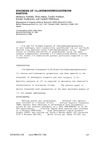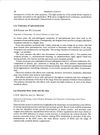 15 citations,
February 2014 in “BMC Research Notes”
15 citations,
February 2014 in “BMC Research Notes” The X5 Hairlaser might help treat male hair loss, but more research is needed.
 6 citations,
September 2019 in “Journal of Cosmetic Dermatology”
6 citations,
September 2019 in “Journal of Cosmetic Dermatology” Laser treatment effectively increases hair density and thickness in androgenic alopecia.
 16 citations,
July 2002 in “JOGC/Journal of obstetrics and gynaecology Canada”
16 citations,
July 2002 in “JOGC/Journal of obstetrics and gynaecology Canada” Birth control pills can help reduce mild to moderate acne in women.
January 2023 in “Pharmaceutics” AA–TF#15 significantly promotes hair regrowth and could be an effective treatment for androgenic alopecia.
 June 2023 in “International journal of pharmaceutical quality assurance”
June 2023 in “International journal of pharmaceutical quality assurance” Eclipta alba extract could be a promising natural treatment for hair loss.
 67 citations,
July 2006 in “Clinics in Dermatology”
67 citations,
July 2006 in “Clinics in Dermatology” Androgens cause skin issues like acne and hair growth in women, often due to PCOS, and can be treated with medication and lifestyle changes.
 55 citations,
July 1999 in “Clinics in Sports Medicine”
55 citations,
July 1999 in “Clinics in Sports Medicine” Athletes use steroids to enhance performance despite health risks and legal issues, and education on their dangers is needed.
 46 citations,
May 1986 in “Seminars in Reproductive Medicine”
46 citations,
May 1986 in “Seminars in Reproductive Medicine” Testosterone and dihydrotestosterone affect hair growth, and new techniques like the folliculogram help study it, but fully understanding hair growth is still complex.
 9 citations,
January 1997 in “Gynecological Endocrinology”
9 citations,
January 1997 in “Gynecological Endocrinology” The document concludes that treating androgen excess needs patience, managing expectations is important, and many drugs used are not officially approved, suggesting cosmetic options for mild cases.
 6 citations,
August 2009 in “Mini-reviews in Medicinal Chemistry”
6 citations,
August 2009 in “Mini-reviews in Medicinal Chemistry” Different drugs can treat high male hormone levels in women, but they have various effects and some may harm a fetus.
 3 citations,
January 2016 in “Elsevier eBooks”
3 citations,
January 2016 in “Elsevier eBooks” Steroid hormones are crucial for body functions and have various medical uses, but their misuse can lead to dependence.
 1 citations,
December 2010 in “InnovAiT”
1 citations,
December 2010 in “InnovAiT” The document concludes that accurate diagnosis and appropriate management are crucial for treating various hair disorders, which have significant psychological impacts.
 441 citations,
May 2008 in “British Journal of Pharmacology”
441 citations,
May 2008 in “British Journal of Pharmacology” Anabolic steroids can build muscle and strength but have risks and need more research on their clinical benefits and side effects.
 104 citations,
January 2005 in “Climacteric”
104 citations,
January 2005 in “Climacteric” Drospirenone is a unique progestin with anti-water retention and potential blood pressure benefits, used in birth control and hormone therapy.
 10 citations,
February 2019 in “Toxicological Sciences”
10 citations,
February 2019 in “Toxicological Sciences” Finasteride exposure affects gene expression and anogenital distance in male rat fetuses.
 6 citations,
April 2013 in “Journal of Investigative Dermatology”
6 citations,
April 2013 in “Journal of Investigative Dermatology” Spironolactone might lower the chance of getting rosacea.
 78 citations,
January 2000 in “Gynecological Endocrinology”
78 citations,
January 2000 in “Gynecological Endocrinology” Norgestimate is the most effective birth control progestin for reducing an enzyme linked to acne and excessive hair growth in women.
 41 citations,
November 2003 in “Annals of the New York Academy of Sciences”
41 citations,
November 2003 in “Annals of the New York Academy of Sciences” Male hormones, or androgens, affect women's health in areas like mood and bone density, and hormone replacement therapy using antiandrogenic progestogens can improve mood disorders and alertness in menopausal women.
 67 citations,
October 2005 in “Annals of Oncology”
67 citations,
October 2005 in “Annals of Oncology” Fulvestrant is a well-tolerated new treatment for advanced breast cancer that may delay chemotherapy.
 3 citations,
July 2011 in “Expert Review of Dermatology”
3 citations,
July 2011 in “Expert Review of Dermatology” Effective treatments for excessive hair growth in women include creams, laser therapy, and medications, with the choice depending on individual needs and potential side effects.
 4 citations,
October 2007 in “Dermatologic Clinics”
4 citations,
October 2007 in “Dermatologic Clinics” Glucocorticoids and sex hormones affect skin health, with potential for targeted treatments to minimize side effects and treat skin conditions.
 May 2023 in “BMC Women's Health”
May 2023 in “BMC Women's Health” Many women who have used performance-enhancing drugs in Finland show high rates of mental health and substance use issues, and most have normal red blood cell counts.
 7 citations,
December 2022 in “Plants”
7 citations,
December 2022 in “Plants” Guava leaf extract may help treat hair loss and protect cells by blocking certain genes and fighting damaging molecules.

Certain drugs can worsen hair loss in people prone to androgenetic alopecia.
 7 citations,
June 1989 in “Steroids”
7 citations,
June 1989 in “Steroids” Researchers successfully made new compounds for hormone level tests, but one attempt led to an unexpected product, correcting a past error.
 2 citations,
December 2019 in “Biomedical dermatology”
2 citations,
December 2019 in “Biomedical dermatology” Minoxidil works faster, but ketoconazole is a safer alternative for female hair loss.
 1 citations,
June 1987 in “British journal of dermatology/British journal of dermatology, Supplement”
1 citations,
June 1987 in “British journal of dermatology/British journal of dermatology, Supplement” Most patients tolerated spironolactone for acne and hirsutism despite common side effects like menstrual changes and breast tenderness.
 12 citations,
August 2017 in “Pharmaceutical medicine”
12 citations,
August 2017 in “Pharmaceutical medicine” Most doctors know the thrombosis risk with Cyproterone/Ethinylestradiol, but some lack details on less common risks and patient instructions; educational materials are underused but useful.
 81 citations,
June 2014 in “American Journal of Men's Health”
81 citations,
June 2014 in “American Journal of Men's Health” Finasteride can cause lasting sexual, emotional, and cognitive issues, with varying severity.
 40 citations,
December 2016 in “Journal of Ovarian Research”
40 citations,
December 2016 in “Journal of Ovarian Research” Rutin may help treat symptoms of polycystic ovary syndrome (PCOS) in rats.





























